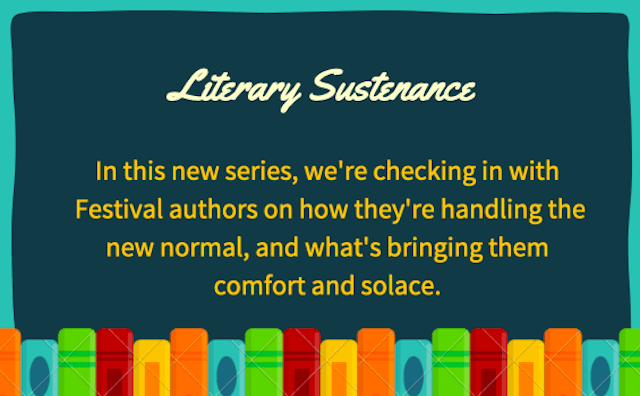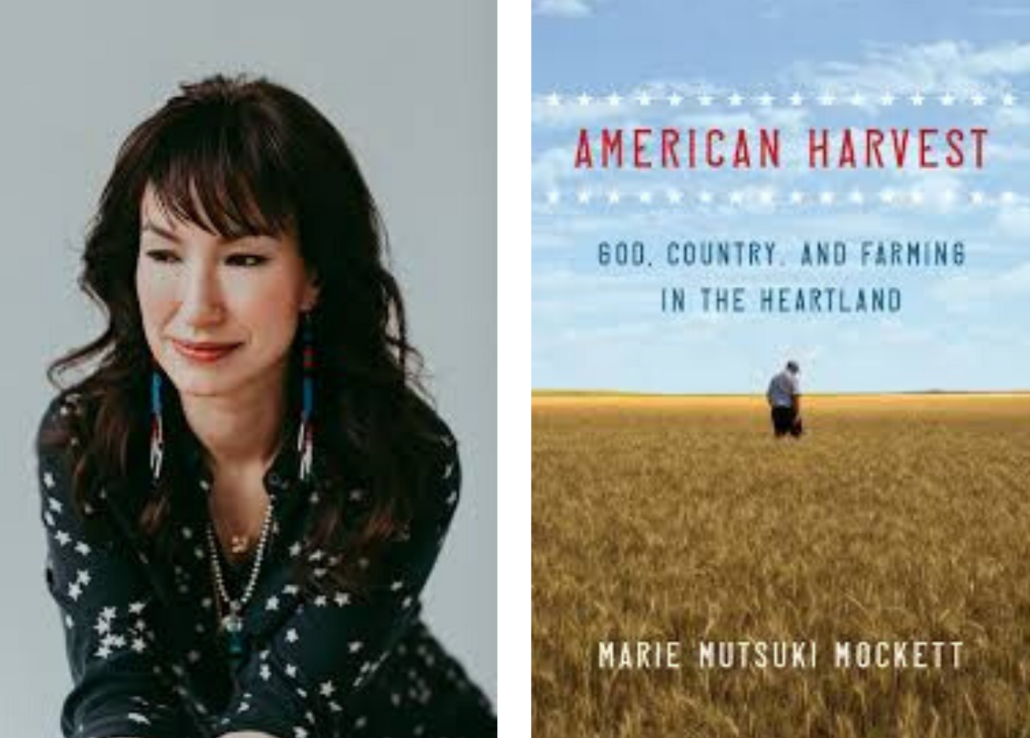We can’t bring you an in-person Festival experience in 2020, but we can stay connected by bringing you literary news, interviews, and dispatches that will hopefully help alleviate the loneliness and tedium of social distancing for our beloved Bay Area community.
“I’ve spent my life watching cultures and countries that are very different engage in misunderstanding, and sometimes, in conflict. I’ve been present when people start to understand each other too. I am at heart an optimist. So many people we know—people I know—are ill and are dying or have died. Since the virus can affect us all, I hope that we learn to work together better, for the sake of everyone.”
– Marie Mutsuki Mockett, author of American Harvest, Where the Dead Pause and the Japanese Say Goodbye, and Picking Bones from Ash
This interview was conducted and written by Kristina Kim, a BABF Writing Intern from UC Berkeley
All across America, people are lining up for hours, waiting for one thing: food. In the midst of the COVID-19 pandemic, unprecedented rates of unemployment have made food insecurity more rampant than ever, and food banks are struggling to cope with the escalating demand. At the same time, the news is filled with stories of farmers unable to distribute their produce to consumers. The disconnect is striking, and begs a simple question: Where does our food come from?
Author Marie Mutsuki Mockett explores this question and more in her third book, American Harvest: God, Country, and Farming in the Heartland, a deeply personal nonfiction journey into the not-so-wild West.
Mockett describes the book as “a road trip to the heartland of America. It starts in Texas, and we end up in Idaho, and as we travel, the reader meets a cast of characters who they might not meet in normal circumstances. We learn a lot about American history, and we watch the characters work really hard to understand each other and bridge a significant cultural divide.”
The characters she speaks of, of course, are real people. Mockett’s inspiration for American Harvest couldn’t be closer to home—and, at the same time, couldn’t be farther from it. Although Marie grew up in California, her father’s side of the family has owned, for 100 years, a seven-thousand-acre wheat farm in the panhandle of Nebraska. Upon inheriting this land, Mockett went to Nebraska in person, accompanying a group of evangelical Christian wheat harvesters through the heartland. American Harvest chronicles this journey, and the revelatory discoveries, about food production, cultural disparities, universality, and human nature, that it yielded.
For Marie, the intersection between her city and country sensibilities presented itself as an opportunity to bring representation to an overlooked topic and place.
“I had a job maybe 15 years ago working for a literary agent,” she recalls. “I was reading her slush pile, and she kept talking about ‘narrative nonfiction,’ and it was a term I’d never heard before. I didn’t understand it as a category of writing, and especially, one that I could do. Around the same time, I went to the wheat harvest with my father, and I looked at everything and thought, ‘Oh my gosh, nobody in New York City knows anything about this—there should be a book about it.’”
Since her journey, Mockett has realized how prescient some of her discussions with Nebraska’s heartland farmers have turned out to be.
“My perspective has definitely shifted,” she said. “One of the themes that reoccurs in the book is that the guys [working in the wheatfields] have a very different relationship to education and high culture, but they’re very, very smart, and [they would talk about] what would happen to the world if there were an apocalypse. Some of them were very influenced by the Book of Revelations, and it was a real thing to them. They would talk about it in terms of food supply. Suddenly, people in the city would be really reliant on people in the country. That was a kind of fantasy that we would talk about, but now we’re kind of living it.”
Mockett, however, remains optimistic, both for the future and for her book. She has good reason: American Harvest has received glowing notices from The New Yorker, the San Francisco Chronicle, and many more, and has attracted the vocal admiration of authors such as Marlon James and Ian Frazier. Pulitzer Prize winner Annie Dillard compared Mockett to Studs Turkel. “Books enable readers to broaden their lives,” wrote Dillard, “and this one―in which Marie Mutsuki Mockett joins a crew harvesting wheat―is a doozy…I never knew a person on a wheat-harvesting crew, and now I do, thanks to Mockett’s vivid and true account.”
“[The book] asks a lot of big questions,” says Marie. “But it’s ultimately a hopeful book, but also an honest book. I hope people can walk away from it with a sense of how beautiful our country is, and I hope it gives readers a greater sense of understanding of where food comes from, and the people behind that.”
Below, Marie shares with BABF a glimpse of her sheltering-in-place experience and how she’s navigating life and writing in a time of lockdown.
BABF: Are there “comfort books” you have in rotation for times like these?
Or has your concept of a “comfort read” changed in the midst of the
utter weirdness and uncertainty of this current situation? What do you
find yourself drawn to, books-wise, right now, whether for escape,
inspiration, or strength?
MMM: I’m not sure I engage in comfort reading, or that my reading habits have changed in any meaningful way. The same cannot be said of comfort baking, and comfort eating. And comfort gardening. I have longer-than-usual conversations with birds in migration and the lemon tree, which is still trying to get over our last drought. I think she will make it.
BABF: What do you feel most compelled to do right now, individually, as a writer?
MMM: My previous book, Where the Dead Pause and the Japanese Say Goodbye, was set against the backdrop of the tsunami and Great East Earthquake in Japan; I spent a lot of time in Japan, talking to survivors of the tsunami and to the Buddhist and spiritual practitioners who tried to help with healing from those traumatic events. So here we are, with a very different but still devastating threat to our sense of peace, health and well being. In American Harvest, I’m interested in how people who might want to fight each other, might instead realize they are mutually dependent, and learn how to communicate. I’m interested in asking what is the actual ground zero of their tension.
I don’t know how many more books I will write, but the experience of writing the last two books has revealed to me that, like it or not, my interests are pretty consistent. I’m concerned with telling the truth about the human experience after asking a hard question, and finding ways to make what is painful a bit easier. I also seem to be drawn to sitting in an uncomfortable space to learn something new.
BABF: What’s one thing you’ve seen or witnessed or experienced since this whole situation began (whether in real life, on social media, in the news, in a book, or whatever) that strengthened your faith in humanity or made you feel hope?
MMM: I’ve spent my life watching cultures and countries that are very different engage in misunderstanding, and sometimes, in conflict. I’ve been present when people start to understand each other too. I am at heart an optimist. So many people we know–people I know–are ill and are dying or have died. Since the virus can affect us all, I hope that we learn to work together better, for the sake of everyone.
BABF: Is there a favorite local indie bookstore or local small business you’d like to namecheck for people to support during this time?
MMM: River Run Books in Carmel is a wonderful independent bookstore with a very well read staff; I love them and worry for their future. The fate of City Lights has been publicized; this is also a favorite bookstore. I have long been in love with Green Apple Books; their new and used selection is always top notch. Finally, Point Reyes Books is a true readers’ bookstore and I hope they, too, are able to survive this storm. Please support any of these independent bookstores, or your own local favorite.


